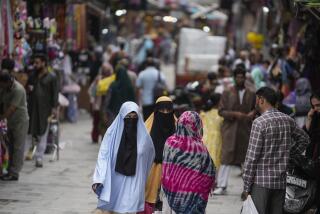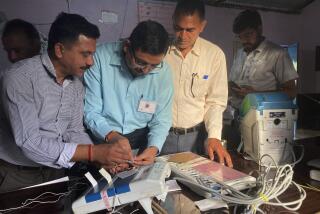Kashmiris Want Focus Put on Daily Needs
- Share via
SRINAGAR, India — As India and Pakistan trade charges over the legitimacy of a bloody election just held in the Indian state of Jammu and Kashmir and analysts ponder the implications for the global war on terror, taxi driver Mohammed Ramzan Dar worries about school fees, why none of his neighbors have jobs and how to afford his daughters’ weddings.
For many people in this beautiful but strife-torn region, the outside world is missing the point. With election results expected today, they say far too much attention has been paid to security and geopolitical issues and far too little to the sorts of bread-and-butter concerns affecting them most.
“The politicians don’t give us anything,” said Mehrajdin Bhat, a 25-year-old student who voted against the government on material rather than ideological grounds. “We need roads, services, jobs. That’s what’s really important.”
Shopkeeper Sunawra Mallik, 65, wants power-sharing--literally. “We need electricity,” he said outside the Khumrayl Town polling station shortly after casting his ballot. “Our living conditions are so backward. How can I get more customers if they can’t see what I’m selling?”
The Kashmir region, with its predominantly Muslim population, has been divided between mainly Hindu India and mostly Muslim Pakistan for more than five decades. The two nations have gone to war twice over the embattled area.
The current fighting, which has gone on for more than a decade, has devastated Kashmir’s economy, undermined people’s confidence in the future and left, by some counts, as many as 60,000 people dead, mostly civilians. Few believe the politicians are addressing these issues.
India has heralded the election’s 44% turnout as a significant achievement in the face of so much violence. It sees the voting--spread over four days, beginning last month and ending Tuesday--as a way to bolster its legitimacy in Kashmir. Pakistan has termed the election a sham, calling instead for a U.N.-sponsored plebiscite on secession.
With hardly a family left untouched by the violence, most Kashmiris dream of peace. Still, many find it’s far easier to focus on concrete local issues rather than elusive negotiations far beyond their control.
“Those are issues for big people,” said Tanveer Ahmad, a local civil servant. “Seventy percent of young people here are unemployed, social problems are increasing, and people are stressed. We just want a bit of bread and a normal life.”
At the Government Psychiatric Diseases Hospital here in Srinagar, the state’s summer capital, doctors say they’re seeing up to 200 patients a day with depression, post-traumatic stress disorder and related problems, a tenfold increase since the current bloodshed started.
“People are exhausted,” psychiatrist Maqbool Dar said. “They need a rest. And most go to faith healers, so we’re only seeing the tip of the iceberg.”
Locals say all too often they feel like pawns being attacked by both sides, pressured one minute by Pakistani-backed separatists to shutter their shops in economic protest and forced the next to open them back up by Indian government soldiers.
The ruling National Conference, a pro-India party that could see its majority slip or even disappear today, is viewed by many as inept or worse. National Conference officials declined to comment.
“I voted against them because they’re a dynastic party and extremely corrupt,” said Hilal Ahmedpir, 25, owner of a small public telephone business that was fired on during the election. “We really need a change.”
Pakistani-backed Kashmiri militants fighting for secession aren’t much better, others say. “In the early ‘90s, most of them enjoyed a lot of sympathy with the local people, but then opportunists took over,” said taxi driver Ramzan Dar. “Now, many wear nice clothes, ride expensive motorbikes and extort money from rich Kashmiris. They’ve lost their ideals. We’re suffering, and they’re not sharing the pain.”
Money spent on about 1 million soldiers positioned along the India-Pakistan border and all the security forces in Kashmir could be far better spent on hospitals, social issues and regional development, said Saier Rasool, 25, a carpet salesman. “The money is being wasted, along with our futures.”
Jammu and Kashmir Police Chief A.K. Suri said Wednesday that 310 civilians, 370 militants and 150 security force members had been killed in violence since Aug. 2, when the elections were announced. Another 500 civilians and 213 security force members were injured, he said.
In the latest fighting Wednesday, militants killed two soldiers near the town of Doda, police said. Three former rebels who had earlier switched sides to work for Indian security forces were shot to death in Khag, west of Srinagar, an officer told Associated Press on condition of anonymity. Four civilians were wounded after rebels threw a grenade at an army convoy in Pattan, north of Srinagar.
More to Read
Sign up for Essential California
The most important California stories and recommendations in your inbox every morning.
You may occasionally receive promotional content from the Los Angeles Times.













